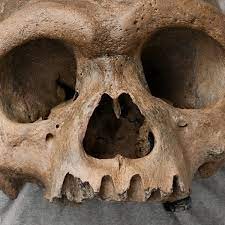
The Enigma of the Nephilim:
The Nephilim have long captivated the imaginations of scholars, theologians, and enthusiasts alike. Described as a race of giants or demigods, the Nephilim are mentioned in ancient texts such as the Hebrew Bible, the Book of Enoch, and Sumerian mythology. Often portrayed as beings of extraordinary size and strength, their existence has remained a subject of debate and speculation for centuries.

The Discovery:
The recent discovery of a Nephilim skull represents a significant milestone in the quest for understanding these enigmatic beings. The archaeologists, led by Dr. Amelia Bennett, unearthed the skull during an excavation in a remote region known for its rich historical significance. The well-preserved nature of the skull, along with its remarkable size and unique features, left the team astounded.
Dr. Bennett, a renowned archaeologist specializing in ancient civilizations and mythologies, expressed her excitement about the discovery. “Finding the Nephilim skull is a dream come true for any archaeologist. It provides us with a tangible link to a mythical past and an opportunity to delve deeper into the mysteries that have fascinated humanity for centuries,” she stated.

Implications and Significance:
The discovery of the Nephilim skull raises significant questions about ancient civilizations and their belief systems. Scholars and researchers anticipate that the detailed analysis of this archaeological artifact will provide insights into the physical characteristics and cultural significance of the Nephilim. It may also contribute to a better understanding of the historical context in which these legends emerged.
Furthermore, the Nephilim skull could potentially challenge existing scientific and religious theories. Its examination could shed light on debates regarding the interplay between mythology and reality, as well as the origins of ancient mythological narratives.
As with any significant archaeological find, skepticism and critical analysis are to be expected. Some experts caution against jumping to conclusions prematurely, emphasizing the need for rigorous scientific investigation. Skeptics argue that the Nephilim skull may have alternative explanations, such as an unusual deformity or a result of cultural practices related to cranial modifications.
